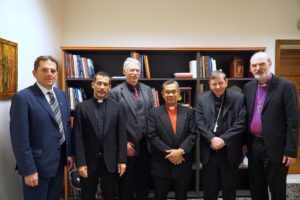Collaboration without Compromise: The World Evangelical Alliance and Roman Catholic Leaders by WRF Members Thomas Schirrmacher and Thomas K. Johnson. Prof. Dr. Thomas Schirrmacher serves the World Evangelical Alliance (WEA) as Associate Secretary General for Theological Concerns.

A WEA delegation visiting the Pontifical Council for Promoting Christian Unity under Kurt Cardinal Koch. Left to right: Sorin Muresan (WEA), Msgr Juan Usma Gómez (PCPCU), Thomas K. Johnson (WEA), Bishop Efraim Tendero (WEA), Kurt Cardinal Koch (PCPCU), Thomas Schirrmacher (WEA) © Thomas Schirrmacher
We sometimes receive strong criticism from evangelical Christians over our friendly interaction, on behalf of the World Evangelical Alliance, with senior Roman Catholic leaders. We have been accused of entering into spiritual union with the Antichrist; some evangelicals have refused to participate in a meeting with us because we have shaken hands with Pope Francis. Interestingly, our friendly meetings with Orthodox Christians, Muslims, Buddhists, Jains, Hindus, or Sikhs do not provoke similar criticisms.
We cannot answer all such critics individually, nor are we inclined to respond to personal attacks. However, the disagreements highlight three crucial issues about public Christian witness and collaboration in a pluralistic world that deserve, we believe, careful attention.
1. It is possible—indeed necessary—to interact in respectful fashion and to collaborate where appropriate with Roman Catholics and people of other faiths without changing or softening our theological convictions.
Some of our critics wonder if we have given up our historic Reformation theological positions and have moved towards accepting Catholic teachings on some topics, or that we think there are no longer major issues separating evangelical and Catholic teaching. This is not true. On the contrary, we have repeatedly affirmed the authority of the Bible and salvation by faith and grace alone, and we have not wavered from our adherence to the Westminster Confession of Faith ever since our ordination vows.
Leonardo De Chirico and Greg Pritchard, in a recent 12,000-word essay, expressed concern that one of us (Schirrmacher), the WEA’s Associate Secretary General for Theological Concerns, could be permitting religious experience to take precedence over the Bible due to our friendship with Roman Catholics. Indeed, involvement in interfaith and intrafaith dialogue can create pressure to water down one’s distinctive convictions in the name of mutual acceptance. However, we think there is ample evidence that we have resisted this threat.
We know that basing theological convictions on experience rather than the Bible has been a central mistake of liberal European Protestant theology for more than two hundred years. Over the last twenty years, we have frequently talked about how this problem tends to recur almost every decade, leading to ever new varieties of liberal theology. For our entire careers we have worked exhaustively to renew Bible-based theology and ethics, with a view to biblical theology guiding spiritual experience and all of life.
 With regard to Roman Catholic theology specifically, Schirrmacher teaches the same doctrine that he taught in his German translation of the Westminster Confession and his book Indulgences, one of the sharpest criticisms of the Catholic view of salvation on the market (available as a free download here). These views have not changed. He is still one of the strongest critics of Roman Catholic theology, but honest criticism of Catholic theology must be accompanied by acknowledging when Catholics agree with us.
With regard to Roman Catholic theology specifically, Schirrmacher teaches the same doctrine that he taught in his German translation of the Westminster Confession and his book Indulgences, one of the sharpest criticisms of the Catholic view of salvation on the market (available as a free download here). These views have not changed. He is still one of the strongest critics of Roman Catholic theology, but honest criticism of Catholic theology must be accompanied by acknowledging when Catholics agree with us.
Our theology has not changed as a result of talking with Catholic, Orthodox, or Coptic leaders; if anything has changed, it is that we have intensified our commitment to a principle that both of us learned from Francis Schaeffer, which Schaeffer learned from John 13:35. The unbelieving world may legitimately demand that we display visible love for other Christians as a proof of our discipleship. We believe that such a display of love among Christians includes interacting socially with leaders of other organizations that are called Christian and seeking to defend people who are persecuted because they are called Christians. We can become close friends with the top leaders of other streams of Christianity while still remaining critical of some themes in their theology; in fact, we believe that we are morally obligated to behave in such a way. Our ultimate intent in all such efforts is to convince our neighbors to believe the gospel through seeing the visible love of Christians for each other.
2. We have different perceptions of both the Roman Catholic Church and the needs of the global evangelical mission movement from those of some of our critics.
From our point of view, the greatest threats to New Testament teaching on justification and salvation by grace and faith within the evangelical movement are not coming from the Catholic Church but result from intra-Protestant or intra-evangelical problems. These problems include simple biblical illiteracy, some types of new interpretations of Paul, and teaching which minimizes or denies the holiness and justice of God, rendering juridical justification unnecessary. In making this claim, we do not intend to lower the standards for teaching justification by grace. We do want to make sure that, amidst the concerns over the implications of Catholic-evangelical relations, we do not overlook other serious threats.
We believe that very few Catholic theologians today would contend openly that the teachings of the Council of Trent can be found in the New Testament. Meanwhile, the Pope and some Catholic spokespeople are teaching justification by faith. As Pope Francis said in a sermon at Lund, Sweden, in October 2016:
The spiritual experience of Martin Luther challenges us to remember that apart from God we can do nothing. “How can I get a propitious God?” This is the question that haunted Luther. In effect, the question of a just relationship with God is the decisive question for our lives. As we know, Luther encountered that propitious God in the good news of Jesus, incarnate, dead and risen. With the concept “by grace alone,” he reminds us that God always takes the initiative, prior to any human response, even as he seeks to awaken that response. The doctrine of justification thus expresses the essence of human existence before God.
We are not lowering our confessional standards by noting the changing theological situation within the Catholic Church.

The serious theological problems separating us from the Catholic Church today are different from those faced by the Reformation. For example, Catholic teachings on Mary pose a greater obstacle to Protestants today than during Luther’s time. And a Catholic–Protestant discussion on Mary has not been substantially launched, although some Catholic leaders have responded to the claim that doctrine and practice regarding Mary currently comprise the biggest obstacles to Catholic–evangelical agreement. (One of us published a meditation on the Virgin Birth, partly to have a text to contribute to such a discussion; it is available here.)
We perceive a huge degree of diversity within the Catholic Church, to the extent that some senior Catholic leaders may not know the convictions of other senior Catholic leaders, and documents emerging from the Catholic Church may even contain unresolved disagreements among different parties within the Catholic Church. At the same time, the Roman Catholic emphasis on the unity of the church makes it much more difficult for Catholics than for evangelicals to openly acknowledge their differences of opinion. Therefore, it can be very hard to determine with certainty if a particular Catholic document is internally consistent, or if the authors of a Catholic statement fully acknowledge, even to themselves, the extent to which they may be departing from previous Catholic statements on that topic.
Though it is our perception that some Roman Catholics are teaching a proper doctrine of justification by faith alone, nevertheless, some Catholic priests and laity probably continue to teach doctrines of justification that are closer to the Council of Trent, contrary to the Reformation and the Bible. This is the diversity of the Catholic Church.
We must not overlook the fact that, under its established system of authority, leaders of the Catholic Church have no way to formally change the positions laid down in their historic documents. Given that situation, it is crucial to distinguish our dialogue with living representatives of the Catholic Church—and their position on many topics—from the official documents. We are convinced that any change has to start on the level of theologians and church leaders or even the Pope himself. All the positive changes that resulted from the Second Vatican Council occurred because of Catholic theologians and bishops and finally the Pope changing their mind.
3. Many top Roman Catholic leaders are our allies on many theological topics (including justification by faith) and most social and ethical problems, even while many Roman Catholics are moving farther from our understanding of biblical truth on other theological topics.
We long to see the church of Jesus Christ grow in numbers and also in depth of discipleship. In our interactions with Roman Catholics, from local parishes all the way up to the Pope, we constantly encourage them to look to the Bible, though we also remind them of the historic Christian creeds. (Surprisingly, not all Roman Catholics seem to comprehend the Nicene Creed; some may not believe all of it.) And we welcome their response when they point us to the Bible and the historic creeds—which does happen sometimes! In all our interactions with Roman Catholics, we maintain the confessional and organizational integrity of the churches in which we are ordained ministers.
Amidst the severe and widespread persecution of Christians today, we consider it an important task of our department of the WEA to develop closer communication and cooperation with the institutions and multiple levels of leadership of the other streams of Christianity on this grave problem. This effort includes taking steps intended to reduce conflict among Christians. Recently we have invested great effort in addressing one common accusation lodged against evangelicals: that our missionaries have been inappropriately engaging in “sheep stealing,” or proselytizing members of other churches. In an era marked by religiously motivated conflict and violence around the globe, it is necessary to listen carefully and peacefully when such accusations arise. Such a response in itself can carry tremendous apologetic significance by demonstrating publicly that Christianity is not a violent faith. By such strategic steps we seek to promote the evangelical faith (never ceasing to be missionaries!) while also calling all forms of religious extremism (which result in the persecution of many Christians) into question morally and politically.
We believe that practicing visible love toward other Christians includes listening to what other parts of Christendom have to say to us. To our overwhelming joy, we are discovering that many Roman Catholics now affirm justification by faith alone because they have read the Bible (and sometimes Martin Luther as well). This is tremendously good news! We want all our neighbors to hear and believe that gospel. This is our constantly affirmed, uncompromised, top priority in our dealings with all Christian and non-Christian faith traditions.
Leave a Reply